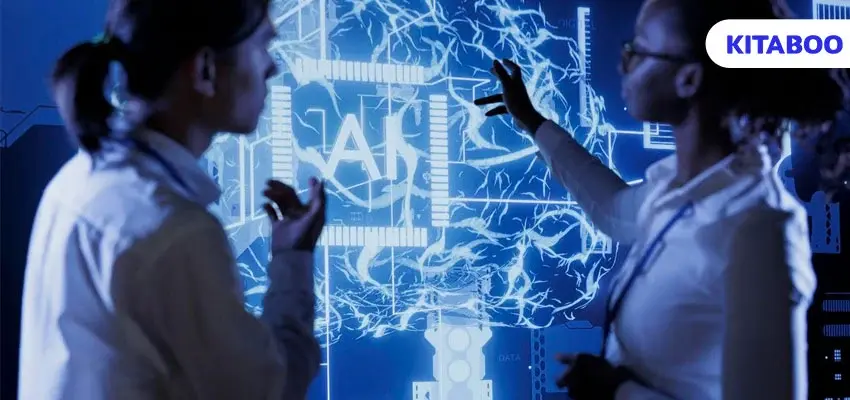
AI: The Game Changer in Educational Product Development
In the fast-moving landscape of education, the advent of Artificial Intelligence (AI) has reinforced the pavement of the higher education journey. The impacts of AI can be seen through its transformative influence on educational product development.
Digital textbook platforms powered by AI, such as KITABOO, allow educational institutions to provide customizable and prolific learning solutions for diverse learning styles.
In this blog, let’s dive deeper into the ways AI serves as a game-changer, reshaping the future of higher education.
Table of Contents
- Understanding Educational Product Development in Higher Education
- AI for Personalized Learning
- Proactive Content Creation
- Scalable Assessments and Feedback Loops
- Improving Teaching Efficiency
- Addressing Learning Gaps and Developing Inclusivity
- Overcoming Educational Challenges
- Conclusion: The Future of Higher Education
Understanding Educational Product Development in Higher Education
Educational product development encompasses the creation of productive tools and resources that can be implemented to serve the unique needs of all students. These products can take the form of digital learning platforms, interactive content, assessment mechanisms, and more.
The ultimate end goal is to align product development with educational goals while making it more engaging and personalized. AI in educational product development can be integrated to tackle various broad challenges.
- The ability to cater learning to individual learning styles and paces.
- The establishment of feedback mechanisms and data-driven education.
- The creation of adaptable and interactive content.
- Improving the efficiency of teaching methods.
Educational products for higher education are designed to be versatile and refined over time with evolving approaches to teaching. For instance, dynamic tools such as digital textbook platforms like KITABOO allow educators to create an environment fit for collaborative and interactive learning.
A measured balance between traditional teaching approaches and emerging educational solutions helps ensure a more effective educational experience in higher education.
AI for Personalized Learning
The advent of AI in educational product development enables personalized learning experiences. Traditional teaching approaches are not dynamic enough to cater to the diverse learning styles and paces of students.
This is where AI comes in, which, through its advanced algorithms, is able to analyze learning patterns and enable the creation of customized educational products.
For example, digital textbook platforms powered by AI, such as KITABOO, can dynamically scale assignments and tasks based on a student’s performance, ensuring the perfect level of challenge in order to keep students engaged in their learning and maximize learning outcomes.
Proactive Content Creation
AI’s ability to bolster content creation and delivery helps address the dire need for relevant and up-to-date educational materials. Natural Language Processing (NLP) algorithms benefit the development of educational tools that can create proactive educational content and assessments.
In the field of higher education, educators can access a variety of resources that are in line with curriculum standards and are designed for the specific requirements of students. AI-driven systems adapt to individual learning styles for a more enjoyable learning process.
Scalable Assessments and Feedback Loops
Traditional assessment methods typically provide surface-level and unintuitive feedback to students. AI-driven assessment tools are able to provide detailed and current feedback on student performances, making use of machine learning algorithms to identify patterns and provide insights into areas for improvement.
The implementation of dynamic feedback mechanisms further involves the recommendation of resources and tailoring future assessments based on individual progress. More dynamic assessments become valuable learning possibilities, inculcating a holistic and supportive educational environment.
Emotional intelligence assessments, powered by AI algorithms, can help educators understand and support student development outside of the classroom. This ensures that educational products go beyond academic success to help develop well-rounded students.
Improving Teaching Efficiency
Educational product development also aims to support educators, providing AI tools that can help educational professionals with comprehensive tasks such as planning lessons according to curriculum guidelines and identifying areas where students may require more detailed information.
AI algorithms can analyze student data to help educators identify trends and refine their teaching methodologies accordingly. This helps enhance the efficiency of educators and also lets them focus on facilitating meaningful interactions with and amongst their students for an enriching learning experience.
AI can also empower educators with professional opportunities through recommendation systems, which can provide suggestions for workshops, relevant resources, and teaching strategies based on individual preferences.
Addressing Learning Gaps and Developing Inclusivity
AI in educational product development helps educational institutions address learning gaps and promote inclusivity. Through the analysis of large sums of data, AI can identify patterns and trends that reveal any anomalies in learning outcomes among different student groups.
Educational products enabled by AI can target these learning gaps by providing customized learning supplements to help ensure that students receive the support they require. This proactive approach helps educators develop a more inclusive educational environment.
Emerging AI-driven technologies, such as speech-to-text applications and customizable learning platforms, help empower students with diverse needs and enable every learner to participate to the best of their ability.
Overcoming Educational Challenges
While the potential of AI in educational product development is expansive, it comes with its own set of challenges and ethical conflicts.
- Privacy concerns arise from data-driven analysis and its potential misuse.
- Biases in algorithms and the need for responsible implementation of AI technologies.
Protecting student data and ensuring that AI algorithms are fair and unbiased requires a delicate balance between innovation and ethical considerations so that educators can harness the power of AI in education without dealing with any of the pitfalls.
Educators, students, and parents should have a clear understanding of how AI is used in educational products, and continuous professional development for educators in AI literacy enables them to navigate the use of AI tools wisely and effectively.
Conclusion: The Future of Higher Education
As AI continues to evolve, the future of higher education products is set to be dynamic and need-based. Educational product development enables personalized learning, interactive content, smarter assessments, improved teaching efficiency, and inclusivity in order to shape the future of education.
As we navigate this landscape, responsible and ethical AI usage is imperative for ensuring that educators can reap the benefits of AI in education while mitigating any potential risks.
Product managers can make use of cutting-edge digital textbook platforms like KITABOO to publish, distribute, and market their solutions to audiences worldwide.
To know more, write to us at contact@kitaboo.com.
Discover how a mobile-first training platform can help your organization.
KITABOO is a cloud-based platform to create, deliver & track mobile-first interactive training content.



